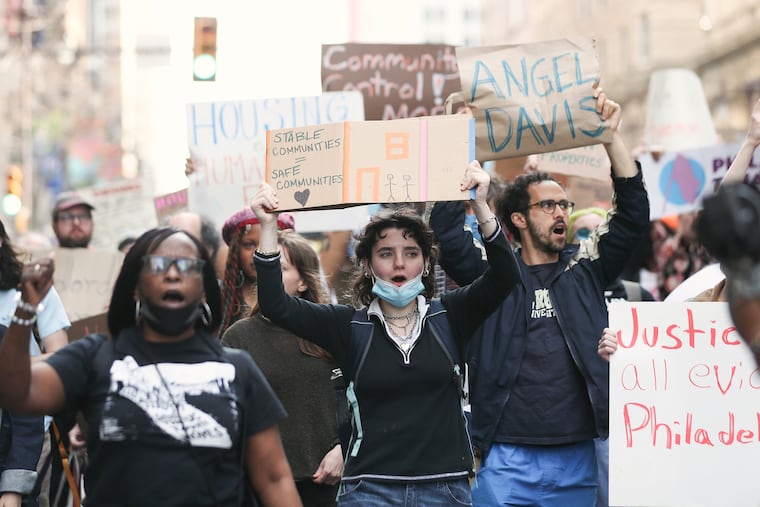Philly’s private eviction system could shut down by end of September over insurance woes
For over a year, city officials have scrutinized the office, after a string of eviction-related shootings by security contractors hired by the office.

The city’s beleaguered Landlord-Tenant Office is on the brink of losing its insurance and could stop evicting people on behalf of landlords as soon as next month, according to a memo obtained by The Inquirer.
Philadelphia is the only county in Pennsylvania that relies primarily on a private attorney — known as a landlord-tenant officer — to handle the notification and enforcement of evictions, in exchange for millions in fees paid by landlords.
For more than a year, city officials have scrutinized the office, after a string of eviction-related shootings by security contractors hired by the office. Just last month, City Council passed a slate of reforms requiring more-intensive training for the contracted deputies.
In an email circulated this week among city officials and landlords, Landlord-Tenant Officer Marisa Shuter said that her office will stop accepting new court-ordered eviction cases on Aug. 12, after failing to find an insurance carrier.
“Unfortunately, our insurance is expiring at the end of September and, to date, we have been unable to secure new insurance,” Shuter wrote. “In light of this, I do not want to accept work that we will be unable to complete before the insurance expires.”
Should insurance come through, Schuter added, her office could continue its work: “However, assuming no new insurance is procured, the office will be shutting down at the end of September.”
The memo has raised concerns among landlord advocates who say there’s no system in place to pick up the workload, should the LTO shut down for good.
Paul Cohen, general counsel for HAPCO, a landlord association, confirmed that he had received notice of the impending shutdown. He called the notice “sudden” and questioned whether the sheriff, which currently handles only a small portion of evictions, had the staff or capacity to absorb hundreds or thousands more cases with only a few weeks’ notice.
“We’re very worried about the entire situation,” Cohen said. “Whatever happens, the landlords have to bear the brunt of the cost.”
The Sheriff’s Office also executes eviction orders, but in recent testimony to City Council, officials there said its deputies are already stretched thin.
In an April budget hearing, both Bilal and her top deputy — Undersheriff Tariq El-Shabazz — stated that the office was struggling to perform basic duties, such as providing courthouse security, due to critical staff shortages. The office is also struggling to process deeds after sheriff sales, with some winning bidders waiting seven months or more to take ownership of the properties.
They sought more than $10 million more in city funding, in part to handle staffing linked to the possible increase in eviction duties.
“We are being considered to take on all evictions now,” El-Shabazz said. “That’s going to require us to take on more personnel.”
Ultimately, the office received less than $3 million under Mayor Cherelle L. Parker’s final budget.
Cohen said that both Shuter and the sheriff have made clear that landlords with active eviction cases being handled by the LTO would need to start their court process over again from scratch, and that would harm his group.
“Our members are small landlords who can’t afford to have people stay in apartments for a long time without paying,” he said.
Representatives for the sheriff and Shuter did not immediately respond to requests for comment. A spokesperson for the sheriff told WHYY that she was not aware of the letter.
The Landlord-Tenant Office, which has handled most evictions in Philadelphia for more than 50 years, moved into the public eye after one of Shuter’s private security contractors shot and critically wounded tenant Angel Davis during a lockout in March 2023. Shots were fired twice more within months; in one of those instances, another tenant was injured and in the other, a shot was fired at a dog but did not hit the animal.
Councilmember Kendra Brooks said Monday she was not surprised to learn that insurance providers had dropped Schuter’s firm, describing the office as a “dangerous for-profit eviction operation.”
The accountability bill she coauthored was meant to hold the LTO to the same standards as other law enforcement agencies, she said.
“If Marisa Shuter is unable to meet that standard, then her office should not be conducting evictions,” Brooks said in a statement. “Every other municipality in the state of Pennsylvania operates without allowing private entities to conduct evictions. I am confident that Philadelphia can find a way to do the same.”
Davis’ attorney Bethany Nikitenko said the closure of the Landlord-Tenant Office “hopefully signals the end of the for-profit eviction system in Philadelphia.”
“Fairness and accountability will only be achieved when the system is beholden to city government and the people of Philadelphia,” Nikitenko said.